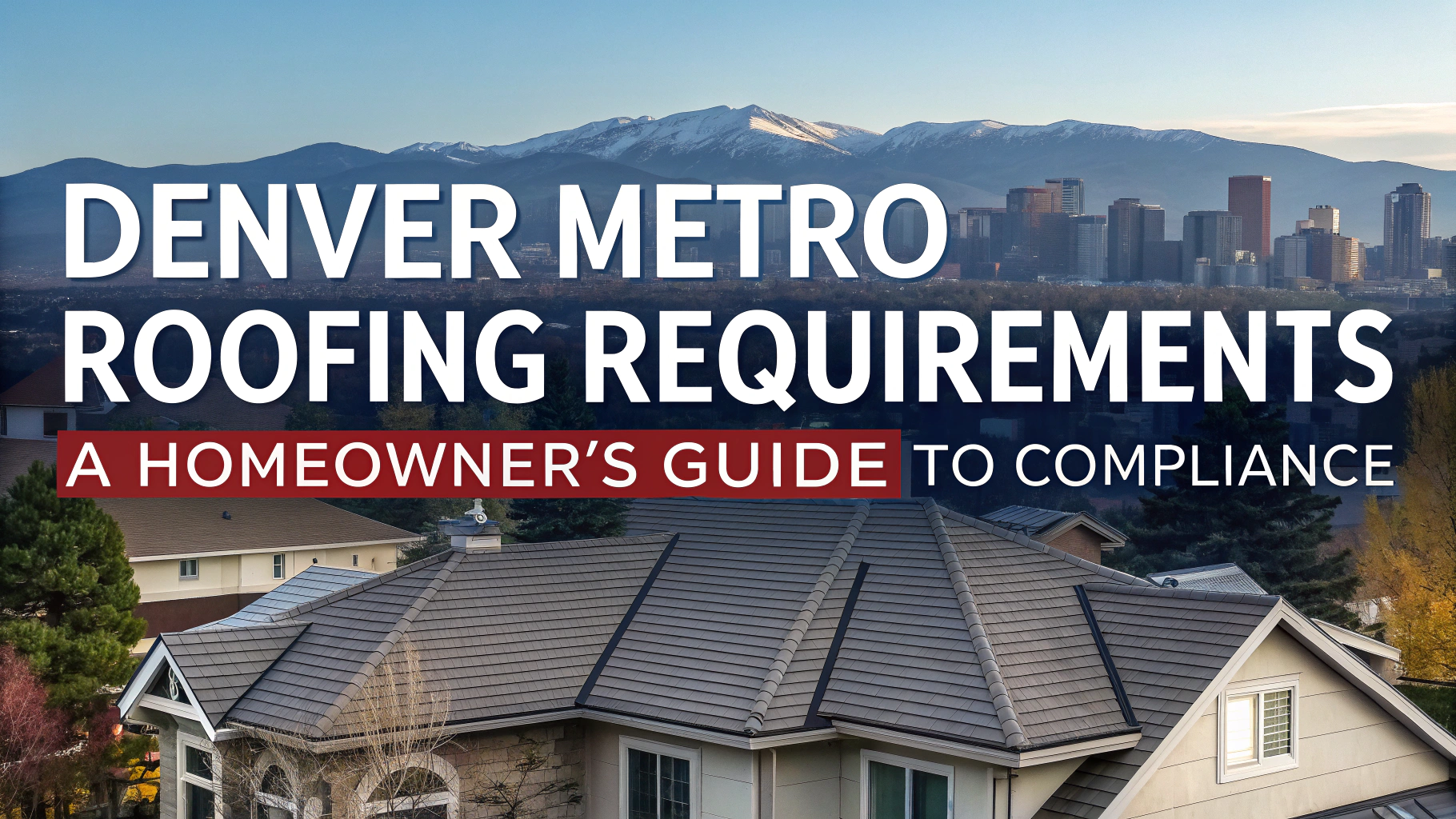Denver homeowners must navigate specific roofing requirements to ensure their properties meet local building codes and withstand Colorado’s unique weather patterns.
Understanding these regulations helps prevent costly repairs, maintain property values, and protect homes from severe weather damage that’s common in the Denver metro area.
This guide covers the essential Denver metro roofing requirements, permit processes, and material specifications that homeowners need to know before starting any roofing project.
Permit Requirements
- Building permit required for all roof replacements and major repairs
- Permit applications available through local building departments
- Typical permit cost: $100-$500 depending on project scope
- Required documents: Project plans, contractor information, material specifications
Material Requirements
Class 4 impact-resistant shingles are required in most Denver metro jurisdictions due to frequent hail storms.
| Material Type | Minimum Requirements |
|---|---|
| Asphalt Shingles | Class 4 impact resistance, 30-year warranty minimum |
| Metal Roofing | 26-gauge minimum thickness |
| Tile | 2,000 PSF snow load capacity |
Ice and Water Shield Requirements
- Required on all eaves extending 24 inches past exterior wall
- Mandatory in valleys and around roof penetrations
- Must meet ASTM D1970 standards
Ventilation Standards
Denver requires 1 square foot of ventilation for every 150 square feet of attic space.
Proper distribution requires both intake vents at the eaves and exhaust vents near the ridge.
Inspection Process
- Pre-installation inspection
- Deck inspection (after tear-off)
- Final inspection
Contact Information
Denver Building Department: (720) 865-2705
Website: Denver Community Planning and Development
Professional Requirements
- Contractors must be licensed in Denver metro area
- $50,000 minimum liability insurance required
- Worker’s compensation insurance mandatory
Weather Considerations
Roofing materials must be rated for:
- 90 mph wind resistance
- Class A fire rating
- 2,000 PSF snow load capacity
Taking Action on Your Roofing Project
Contact multiple licensed contractors for quotes and verify their credentials through the Denver Building Department before starting any roofing work.
Schedule inspections well in advance to avoid project delays.
Keep all documentation, including permits, warranties, and inspection reports, for future reference and home resale value.
Project Timeline Considerations
Typical roofing projects in Denver follow this timeline:
- Permit acquisition: 3-5 business days
- Material delivery: 1-2 weeks
- Installation: 2-4 days for average home
- Inspection scheduling: 2-3 business days
Cost Factors
Denver roofing projects typically include these expenses:
- Permit fees: $100-$500
- Material costs: $4.50-$9.00 per square foot
- Labor: $2.50-$5.00 per square foot
- Inspection fees: Included in permit cost
Common Violations to Avoid
- Installing non-compliant materials
- Skipping required inspections
- Inadequate ventilation installation
- Improper ice and water shield application
- Working without proper permits
Protecting Your Roofing Investment
Follow these essential steps to ensure a successful roofing project:
- Document all phases with photos
- Maintain copies of all permits and inspections
- Register manufacturer warranties
- Schedule annual maintenance inspections
- Keep detailed records of all work performed
Securing Your Denver Home’s Future
Meeting Denver’s roofing requirements not only ensures code compliance but also protects your home investment. Proper installation and documentation safeguard against weather damage and support property values.
Working with licensed professionals and maintaining detailed records throughout your roofing project creates a solid foundation for long-term home protection in Denver’s challenging climate.
Remember to regularly inspect your roof and maintain documentation for future reference, ensuring your home remains protected and compliant with local regulations.
FAQs
- What permits do I need for a new roof in the Denver Metro area?
You need a building permit from your specific municipality (Denver, Aurora, Lakewood, etc.). Most jurisdictions require permits for both new installations and replacements exceeding 100 square feet. - What are the required ice and water shield requirements for Denver roofs?
Ice and water shield must extend at least 24 inches past the interior wall line and is required in valleys and around all roof penetrations. It’s mandatory in areas prone to ice damming. - How often should roof inspections be performed in Colorado?
Professional inspections should be conducted twice yearly (spring and fall) and after major storms due to Colorado’s extreme weather conditions, including hail and heavy snow. - What roofing materials are approved for use in Denver’s climate?
Class 4 impact-resistant materials are strongly recommended due to frequent hail. Approved materials include concrete tile, slate, metal roofing, and impact-resistant asphalt shingles rated for high winds. - What is the minimum roof slope requirement in Denver?
The minimum slope for asphalt shingles is 2:12 pitch. Slopes between 2:12 and 4:12 require special installation procedures and additional underlayment. - Are there specific ventilation requirements for Denver roofs?
Yes, Denver requires a minimum of 1 square foot of ventilation for every 300 square feet of attic space, with balanced intake and exhaust vents. - What are the requirements for drip edge installation in Denver?
Drip edge is mandatory on all eaves and rakes, must overlap proper underlayment at eaves, and underlayment must overlap drip edge at rakes per International Building Code. - What wind resistance ratings are required for Denver roofing materials?
Roofing materials must be rated for minimum 90 mph wind resistance in most Denver metro areas, with some jurisdictions requiring 100-110 mph ratings in higher elevation locations. - How long do I have to complete my roof replacement once started?
Most Denver jurisdictions require roof projects to be completed within 30 days of starting, weather permitting, with temporary weatherproofing required for any delays. - What underlayment requirements exist for Denver roofs?
A minimum of one layer of #15 felt or synthetic equivalent is required for slopes 4:12 and greater. Two layers are required for slopes between 2:12 and 4:12.
